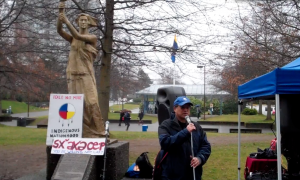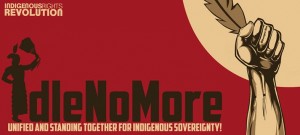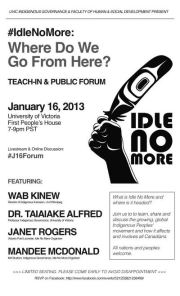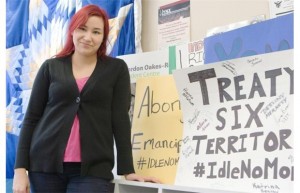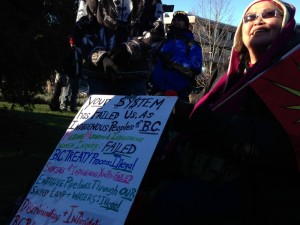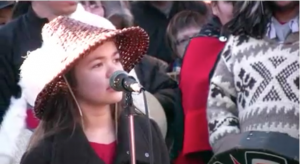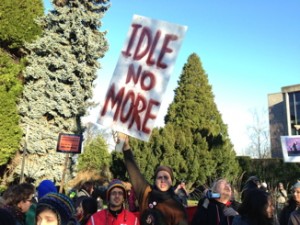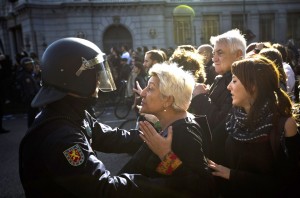Georgia Straight, Yolanda Cole, February 6, 2013 — THE IDLE NO More movement is undergoing a moment of “pause and critical reflection”, in the view of one participant.
Speaking at an Idle No More “teach-in” event at the University of British Columbia on February 1, Coulthard addressed the potential impact of direct actions staged by the movement.
The political science and First Nations Studies faculty member argued that grassroots forms of protests such as blockades have historically led to changes on indigenous issues.
“Historically, I would venture to suggest that all negotiations, over the scope and content of aboriginal people’s rights in the last 40 years, have piggybacked off of the assertive direct actions, including the escalated use of blockades, spearheaded by indigenous women and other grassroots elements of our community,” Coulthard told a crowd of more than 300 students and members of the public at the First Nations House of Learning at UBC.
Coulthard, a member of the Yellowknives Dene First Nation, disputed what he said is an assumption that official negotiations among leadership are the “most productive means to forge real change in the lives of indigenous communities”.
“I think that there’s a latent understanding that the negotiations aren’t about making the transformative changes that indigenous peoples need in order to live healthy, cultured lives, and if you look at the history of negotiations, they’ve always come in order to placate the transformative energy that has emerged in more grassroots forms of protest actions,” he said in an interview.
In fact, he argued, inquiries such as the Royal Commission on Aboriginal Peoples and the B.C. missing women inquiry wouldn’t have occurred if sustained direct actions led by indigenous communities hadn’t brought attention to the issues.
Coulthard noted it wouldn’t surprise him if Idle No More demonstrations escalate to “more assertive” forms of peaceful protest. Idle No More actions in Ontario have included railway and highway blockades.
“I think that it’s pretty clear that the federal government is maintaining its stance on the problematic pieces of legislation that have upset indigenous peoples so much,” he stated. “And if history has taught us anything, these cycles of anger and pent-up frustration will tend to be played out in activism.”
The demonstrations were initially sparked out of opposition to federal omnibus legislation that included changes to the Indian Act and the Navigable Waters Protection Act.
Coulthard noted that the movement has gained unprecedented sustained attention from the general population.
“I think it’s because Canadians, nonindigenous peoples, are seeing their own interests perhaps better represented by indigenous peoples, especially concerning environmental sustainability and the land,” he said in an interview. “These legislative changes are also violations of nonindigenous peoples’ aspirations with respect to the integrity of the land, having it shared more equitably.”
In Coulthard’s view, movements like Idle No More “have within their sights, now more than ever” a restructuring of the relationship between indigenous peoples and Canada. But he added that changes to that relationship are a “distant, long-term goal”.
“The impacts [of the movement] will be long-term, and they will eventually compel Canada to come to the negotiating table on equitable terms, honor its treaty obligations, and correct the colonial relationship between indigenous peoples and the state,” he said.
“The inequalities and the privileges that have built up are centuries old now, so it’s not going to happen overnight.”
Red More: Georgia Straight

 Follow
Follow